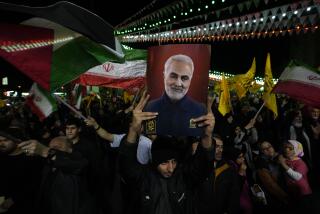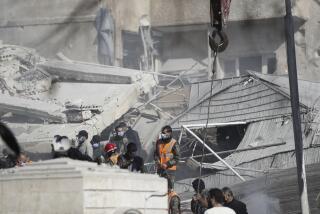10 Killed in Car Bombing Near Baghdad Police Station
- Share via
BAGHDAD — A powerful car bomb devastated the area near a police station in southwest Baghdad this morning, destroying nearby car repair shops where Iraqis were servicing their vehicles.
U.S. Lt. Col. William Salter said at least 10 people were killed and 40 wounded. Dozens of ambulances were dispatched to the scene.
It was the third major attack in Baghdad in six days. On Wednesday, a bomb near the entrance to the offices for the interim Iraqi government killed at least 11 people. Three days later, the Justice Minister survived an assassination attempt, but five of his bodyguards died in the attack.
Body parts and shreds of burnt uniforms of police officers and members of the Iraqi National Guard were scattered across the area as crowds searched for relatives and friends.
The bomber stopped short of the police station but appeared to have timed his arrival to the morning shift change.
Police Commissioner Ali Adil, who was bleeding from a head injury, said he was having breakfast when “a huge explosion happened. The man who carried me said three of my colleagues died.”
Jassim Abdul Zahra, who was selling diesel nearby, said the bomber was driving a “a white tanker, and he parked it and then the explosion happened.”
The bombing came a day after Iraq’s interim prime minister sanctioned the reopening of a radical cleric’s newspaper, which had been closed by American officials in March because they said it was inciting attacks on U.S.-led forces and their Iraqi allies.
The decision approving the paper’s plans to start up again appeared to be a reminder of Iraq’s independence from previous U.S. policy as well as an effort to reach out to Shiite Muslims who support the paper’s controversial backer, Muqtada Sadr.
The Shiite cleric has condemned the interim government as an agent of the United States but recently stopped short of calling for armed action.
Interim Prime Minister Iyad Allawi said the newspaper’s resumption of publication was an indication of his “unlimited faith in the freedom of the press” and his “optimism about removing any obstacles before the Iraqi people in all areas of life,” including those in Sadr’s movement.
The paper’s closure was one of several events, including the arrest of a cleric affiliated with Sadr, that touched off a rebellion in April by Shiites in cities across south-central Iraq and in the vast, poor Baghdad neighborhood of Sadr City.
Many Shiites support Sadr and are especially loyal to his father, a cleric who used his pulpit to rally the faithful against Saddam Hussein.
The elder Sadr, for whom the neighborhood in the capital is named, was assassinated in 1999 at the behest of the former Iraqi leader.
Under terms of the March 28 closure, the paper had to halt publication for 60 days. But Al Hawza remained closed until four days ago, said editor Ali Yassiri. He said he had been waiting for instructions from Sadr headquarters in Najaf, the Shiite holy city south of Baghdad, before reopening.
On Sunday evening, Yassiri sat in the newspaper’s offices. On a table nearby were the heavy steel locks and chains with which U.S. soldiers had sealed the offices. Yassiri had to saw them off to reopen.
“This is American democracy,” he said, pointing at the locks. Then he smiled broadly. “I am as happy today as I was sad the day my paper was closed. I missed my newspaper very much.”
He plans to start publishing the weekly again with the July 29 issue. Usually between 10,000 and 12,000 copies are distributed through wholesalers and mosques. Although he puts out a relatively small printing, Yassiri said each copy is typically read by at least 10 people.
U.S. forces, meanwhile, continued to play a central role Sunday in going after suspected insurgents near Fallouja, launching an early-morning airstrike just south of the city, according to a military statement.
Brig. Gen. Erv Lessel, deputy director of the U.S.-led forces, said the operation targeted “a known terrorist fighting position.” According to Lessel’s statement, the strike “destroyed defensive fighting positions and trench lines near the remains of a house and a foreign fighter checkpoint.”
Approximately 25 fighters with ties to militant leader Abu Musab Zarqawi were present at the site just prior to the strike, the statement said.
Fallouja residents condemned the attack, saying 10 civilians had been killed and that all of the dead were Iraqis.
It was at least the fifth strike in the last month on suspected “safe houses” in the town, where the military believed insurgents linked to Zarqawi were hiding.
In a news conference after his arrival in Baghdad on Sunday, Deputy Secretary of State Richard L. Armitage said the Iraqi government “was fully informed” of the attack and “agreed with us on the need to take action.”
Also on Sunday, U.S. forces said they had detained a former senior commander in Hussein’s Republican Guard suspected of planning and financing attacks against civilians, Iraqi security forces and U.S.-led troops. Sufyan Maher Hassan was captured Friday in Tikrit. Hassan commanded units defending Baghdad during the war.
Two car bombs targeting police exploded in Tikrit, killing two officers, wire services said.
*
Ashraf Khalil and Raheem Salman in The Times’ Baghdad Bureau contributed to this report.
More to Read
Sign up for Essential California
The most important California stories and recommendations in your inbox every morning.
You may occasionally receive promotional content from the Los Angeles Times.













